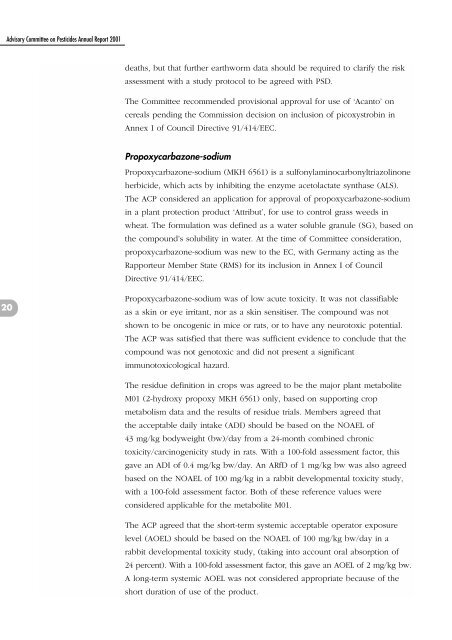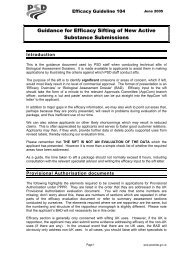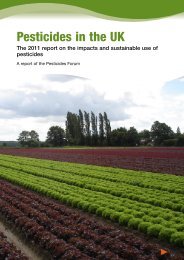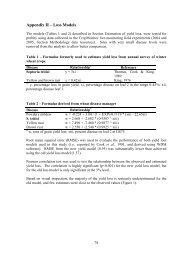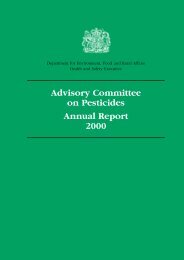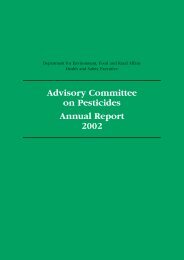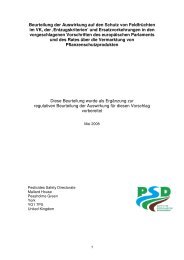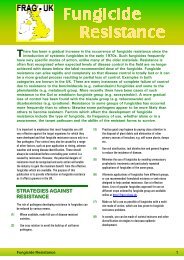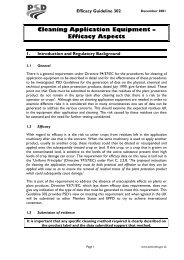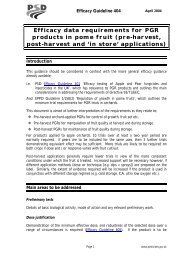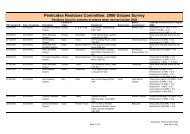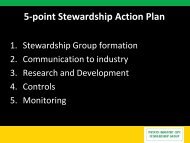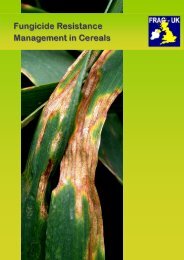Advisory Committee on Pesticides Annual Report 2001
ACP Annual Report 2001 - Pesticides Safety Directorate
ACP Annual Report 2001 - Pesticides Safety Directorate
Create successful ePaper yourself
Turn your PDF publications into a flip-book with our unique Google optimized e-Paper software.
<str<strong>on</strong>g>Advisory</str<strong>on</strong>g> <str<strong>on</strong>g>Committee</str<strong>on</strong>g> <strong>on</strong> <strong>Pesticides</strong> <strong>Annual</strong> <strong>Report</strong> <strong>2001</strong><br />
deaths, but that further earthworm data should be required to clarify the risk<br />
assessment with a study protocol to be agreed with PSD.<br />
The <str<strong>on</strong>g>Committee</str<strong>on</strong>g> recommended provisi<strong>on</strong>al approval for use of ‘Acanto’ <strong>on</strong><br />
cereals pending the Commissi<strong>on</strong> decisi<strong>on</strong> <strong>on</strong> inclusi<strong>on</strong> of picoxystrobin in<br />
Annex I of Council Directive 91/414/EEC.<br />
Propoxycarbaz<strong>on</strong>e-sodium<br />
Propoxycarbaz<strong>on</strong>e-sodium (MKH 6561) is a sulf<strong>on</strong>ylaminocarb<strong>on</strong>yltriazolin<strong>on</strong>e<br />
herbicide, which acts by inhibiting the enzyme acetolactate synthase (ALS).<br />
The ACP c<strong>on</strong>sidered an applicati<strong>on</strong> for approval of propoxycarbaz<strong>on</strong>e-sodium<br />
in a plant protecti<strong>on</strong> product ‘Attribut’, for use to c<strong>on</strong>trol grass weeds in<br />
wheat. The formulati<strong>on</strong> was defined as a water soluble granule (SG), based <strong>on</strong><br />
the compound’s solubility in water. At the time of <str<strong>on</strong>g>Committee</str<strong>on</strong>g> c<strong>on</strong>siderati<strong>on</strong>,<br />
propoxycarbaz<strong>on</strong>e-sodium was new to the EC, with Germany acting as the<br />
Rapporteur Member State (RMS) for its inclusi<strong>on</strong> in Annex I of Council<br />
Directive 91/414/EEC.<br />
20<br />
Propoxycarbaz<strong>on</strong>e-sodium was of low acute toxicity. It was not classifiable<br />
as a skin or eye irritant, nor as a skin sensitiser. The compound was not<br />
shown to be <strong>on</strong>cogenic in mice or rats, or to have any neurotoxic potential.<br />
The ACP was satisfied that there was sufficient evidence to c<strong>on</strong>clude that the<br />
compound was not genotoxic and did not present a significant<br />
immunotoxicological hazard.<br />
The residue definiti<strong>on</strong> in crops was agreed to be the major plant metabolite<br />
M01 (2-hydroxy propoxy MKH 6561) <strong>on</strong>ly, based <strong>on</strong> supporting crop<br />
metabolism data and the results of residue trials. Members agreed that<br />
the acceptable daily intake (ADI) should be based <strong>on</strong> the NOAEL of<br />
43 mg/kg bodyweight (bw)/day from a 24-m<strong>on</strong>th combined chr<strong>on</strong>ic<br />
toxicity/carcinogenicity study in rats. With a 100-fold assessment factor, this<br />
gave an ADI of 0.4 mg/kg bw/day. An ARfD of 1 mg/kg bw was also agreed<br />
based <strong>on</strong> the NOAEL of 100 mg/kg in a rabbit developmental toxicity study,<br />
with a 100-fold assessment factor. Both of these reference values were<br />
c<strong>on</strong>sidered applicable for the metabolite M01.<br />
The ACP agreed that the short-term systemic acceptable operator exposure<br />
level (AOEL) should be based <strong>on</strong> the NOAEL of 100 mg/kg bw/day in a<br />
rabbit developmental toxicity study, (taking into account oral absorpti<strong>on</strong> of<br />
24 percent). With a 100-fold assessment factor, this gave an AOEL of 2 mg/kg bw.<br />
A l<strong>on</strong>g-term systemic AOEL was not c<strong>on</strong>sidered appropriate because of the<br />
short durati<strong>on</strong> of use of the product.


